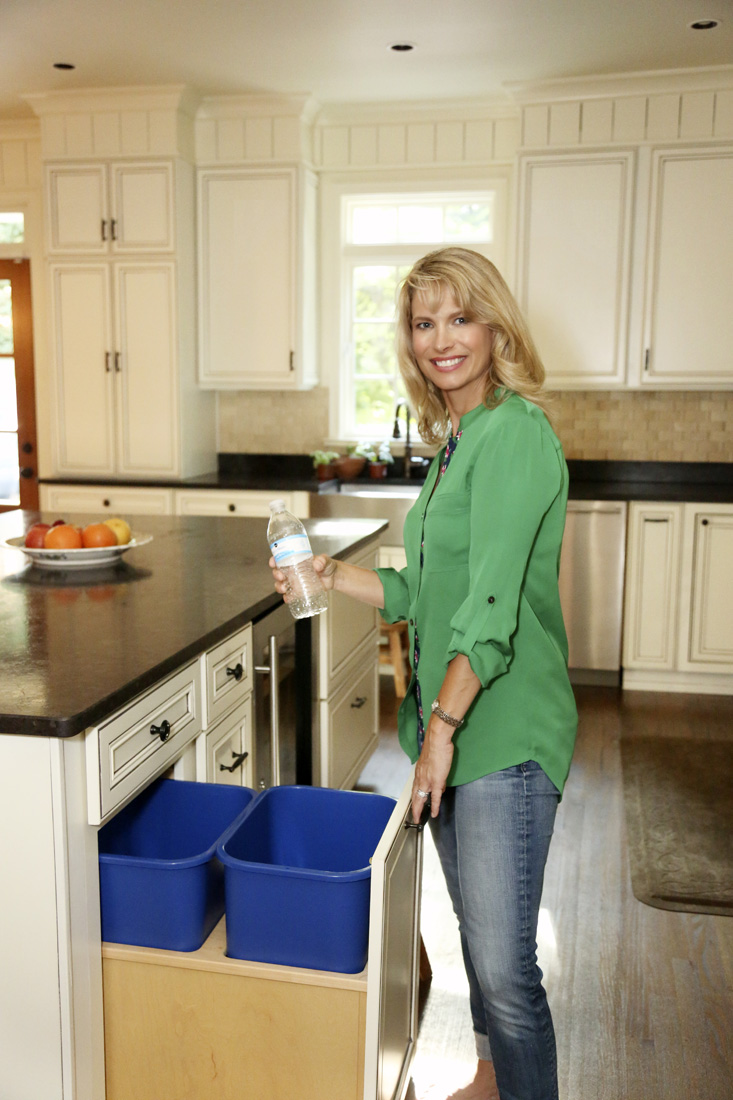Set up a recycling station.
According to the EPA, if every one of the 96,000 single-family homes that Atlanta’s Department of Public Works Solid Waste Services picks up waste from recycled just one plastic bottle, it would save enough energy to power a laptop computer for 240,000 hours. Needless to say, if you only do one thing for the environment this year, recycling is a solid choice. Residential curbside recycling varies by county, but within the city limits, it includes household paper, cardboard, glass, cans and hard plastic (labeled 1-7). It does not include paper towels, plastic bags, plastic furniture, pizza boxes, plastic food utensils, food containers (such as your Starbucks cup or Chinese takeout box) or building materials. For a full list of what you can and cannot recycle, visit Atlantaga.gov/recycling. Perhaps just as important as what you can recycle is how you recycle. “People really screw it up because they just don’t know. Don’t put dirty stuff in the recycling bin,” Hankey says. Cooke adds, “Wash everything you are recycling so as not to contaminate recyclables.” Additionally, remove lids from containers and break down cardboard boxes. Drop off items that your weekly solid waste service doesn’t recycle at Buckhead’s community recycling on the first Saturday of every month between 10 a.m. and 3 p.m. at Second-Ponce de Leon Baptist Church. Here, you can recycle virtually everything, including electronics, aerosol cans, plastic food containers, paint, Styrofoam, tires, all types of metals, household textiles, luggage and much more that would otherwise go in a landfill. Visit Keepatlantabeautiful.org/recycle for more information.
Stop washing dishes by hand.
That is, if you have an Energy Starrated dishwasher. If you don’t, make it a green purchase when your old machine is on its way out. These days, the highly energy-efficient dishwashers use up to 40 percent less water than doing the scrubbing yourself in the sink. “Old appliances can use up a lot of energy,” Cooke says.
Opt for alternative cleaning technologies.
It doesn’t have to be all about a chemical-laden spray. For daily washing of countertops, Reichert suggests using a high-quality microfiber cloth, such as E-cloth (available at Bates Ace Hardware), and a simple spray of hydrogen peroxide or even vodka. She explains: “We love to kill things! But microfiber cloths do an excellent job of picking up and removing bacteria instead of killing it. It works like a Velcro hook—it goes up under bacteria and holds onto it until you put the cloth in the washer.” You only need to throw the E-cloth in the washer if you’re cleaning high-bacteria areas. If you’re light cleaning, such as wiping the table or cupboards, you can just give it a good rinse in hot water with a bit of dish soap. You’ll save a ton of paper towels while you’re at it. As for cleaning inside the sink or removing dirt from cabinet doors, Reichert prefers micro scrubbers, such as Mr. Clean Eraser Sponge (available on Amazon.com). “These are fabulous for cleaning inside of a stainless steel or porcelain sink. They work like a big pencil eraser: Instead of using a chemical, they use friction to heat up dirt and melt it away,” she says. For hardcore disinfecting, Hankey prefers CleanWell Botanical Disinfecting Wipes (available on Amazon.com) that use thyme, a natural antiseptic, as the active ingredient, and Pure- Green24 (available at Puregreen24. com), a spray that kills bugs and lasts on surfaces for 24 hours.
STORY: Karina Antenucci
PHOTOS: Sara Hanna
Managing Editor and Wellness Columnist at Simply Buckhead. Blogger at Badass + Healthy.












